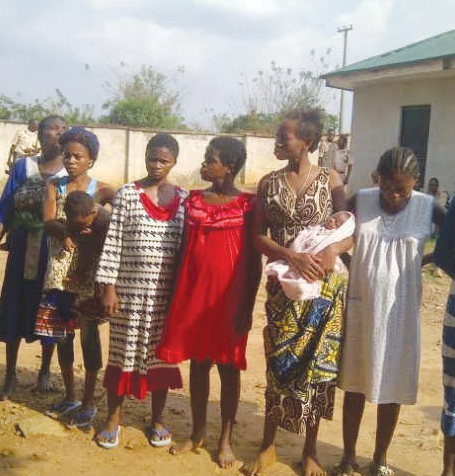Childless couples hardly adopt in Nigeria, despite the growing number of children in motherless babies’ homes and of ‘factories’ where babies are produced for sale.
Special Correspondent, CHARLES IHEJIRIKA, examines how a cultural mindset feeds the problem.
Let us call him Udoka.
Udoka is the first child and son of his family. He is married, happily married, it is presumed; but extended family members do not think so.
They moan that he has been married for 20 years without a child. There are agitations that he should marry a second wife, one who is sure to fill his home with little, adorable kids.
He does not say no to their request, neither does he say yes. He feeds them silence. And the family takes his silence as total submission. His wife, Cecilia, can only cry and worry.
Months later, there are children playing about in Udoka’s home.
Extended family members should be happy now? They are not. They rile against him.
They say he has committed a taboo, that he should have married a second wife and have children from his own loins. Not from someone he does not and may never know.
They say he should not have adopted children.
As usual, Udoka replies them with silence. With time, the family clamour gives way to resignation. But there is still the palpable feeling of disappointment, of the fear that he made a wrong decision.
Adoption and Nigerian society
In Nigeria especially, and Africa in general, the pride of a wife is her ability to “be fruitful and multiply”, even though the counsel is given jointly to the husband and wife, not just the wife (Genesis 1:27-28).
When a couple is childless, the wife is tagged incomplete – even when the biological problem is in the man – and the family is besieged by ‘advisers’ comprising relatives, friends, and others concerned with the ‘welfare’ of the marriage.
Usually, the man is advised to bring another woman to the home or keep her elsewhere to bear him children.
Families who are yet to have children are hardly advised to adopt.
The concern of advisers is restricted to ‘in-parenting’ (having one’s own children) and not ‘out-parenting’ (adopting other people’s children).
But should adoption not be seen as a worthy way of having children?
Why families adopt
Emmanuel Nkwocha, a civil servant, gives a variety of reasons as to why families adopt.
“Some families adopt children because they cannot have kids of their own – maybe because of sickness or disease. For example, impotence,” he says.
“Another reason people adopt is when they have male children, and maybe because of their love for female children they may choose to adopt a girl.
“Some families also have female children all along, and in their need for a male, they can decide to adopt a boy.”
A member of the National Youth Service Corps (NYSC), Ogbonnaya Idam, cites social and psychological reasons.
Because of the notion about childlessness, he says, families are forced to adopt so they can relief themselves of the immense pressure put particularly on the wife.
Should families adopt?
Nwokocha believes adoption is not worth it. He says given the current state of the Nigerian society, advising a couple to adopt will only cause trouble.
“In Igbo tradition,” he explains, “a male child adopted into the family has no share in the father’s inheritance because he is not of that blood.
“This has caused a lot of misunderstanding and enmity, where even when the child grows up he is not entitled to anything in the family. He will not be recognised by the other members of the family.
“When this child finds himself in this situation, he is sure to feel unhappy and disillusioned. Then he starts questioning his parents about his heritage.
“In the case of a girl, there is not much trouble because she will eventually get married.
“If families must adopt, let them adopt their siblings’ children. Couples should examine themselves and find out; they should reach an agreement to get a second wife who will give birth to children.
“I believe that system will bring peace in the family. The wife can choose a suitable relative of hers who she thinks is good for her husband [as a second wife].”
Idam also believes adoption is not a healthy route.
“When you adopt a child, you do not know where the child is from; you do not know the father or mother and who they are and the lives they live or have lived.
“If the father is a thief, the gene of stealing may be in the child and you may find yourself harbouring a future thief.”
Baby factories
Baby factories are a reoccurring decimal in Nigeria and other parts of the world.
Police have conducted raids in which the illicit trade of babies for money is uncovered. Children are not seen as a gift from God as the Bible says (Psalm 127:3), but rather as commodities that can be exchanged for money.
“The system of adoption in Nigeria has been corrupted, especially in the Eastern part of the country,” Nwokocha says.
“People now do it the wrong way: they buy children from young girls housed somewhere; and even when the girls are not pregnant, they pay them to get pregnant. It is a very sad reality.”
Islamic view on adoption
The Islamic website, islam.about.com, says “the Prophet Muhammad (peace be upon him) once said that a person who cares for an orphaned child will be in Paradise with him, and motioned to show that they would be as close as two fingers of a single hand.
“An orphan himself, Muhammad paid special attention to the care of children. He himself adopted a former slave and raised him with the same care as if he were his own son.”
Christian view on adoption
Eli adopted Samuel, a believer, as his son and raised him to serve God (1 Samuel 1:24-28).
Samuel was saved and was fruitful for God and for Eli (1 Samuel 3:1-18); Eli’s biological sons, Hophni and Phinehas, were not (1 Samuel 2:12-17, 34).
The Christian website, Christian Adoptions.org, says according to the Bible, adoption is as an outpouring of God’s grace on all involved and adoption upholds the Scriptural emphasis on the role of the father.
It adds that “adoption in strict terms is a legal process. But it is important to see that adoption is more than a legal contract – it is a relationship of promise.
“The adoption process goes through the courts and is made legal, but as in all parent/child relationships, it becomes much more than that.
“Although we have seen the importance of two parents, the father’s role as illustrated in the Scriptures is separate and distinct from the mother’s.
“The Bible speaks of the father as a man of compassion, a teacher at home, and a man to be honoured by his children.
“Proverbs especially elaborates on these important roles a father can and should play in the lives of his children.
“God purposefully chose to relate to us as a Father. Our earthly fathers are important in modeling or being images of God as Father.”
The website cites the relationship between Joseph and Jesus Christ.
“Perhaps the most profound example of adoption in the Scriptures is Joseph’s adoption of Jesus. Joseph assumed the role of Jesus’ father for all intents and purpose.
“It should not surprise us that God desired for Jesus to have an earthly father, consistent with His plan for marriage and parenthood.”














